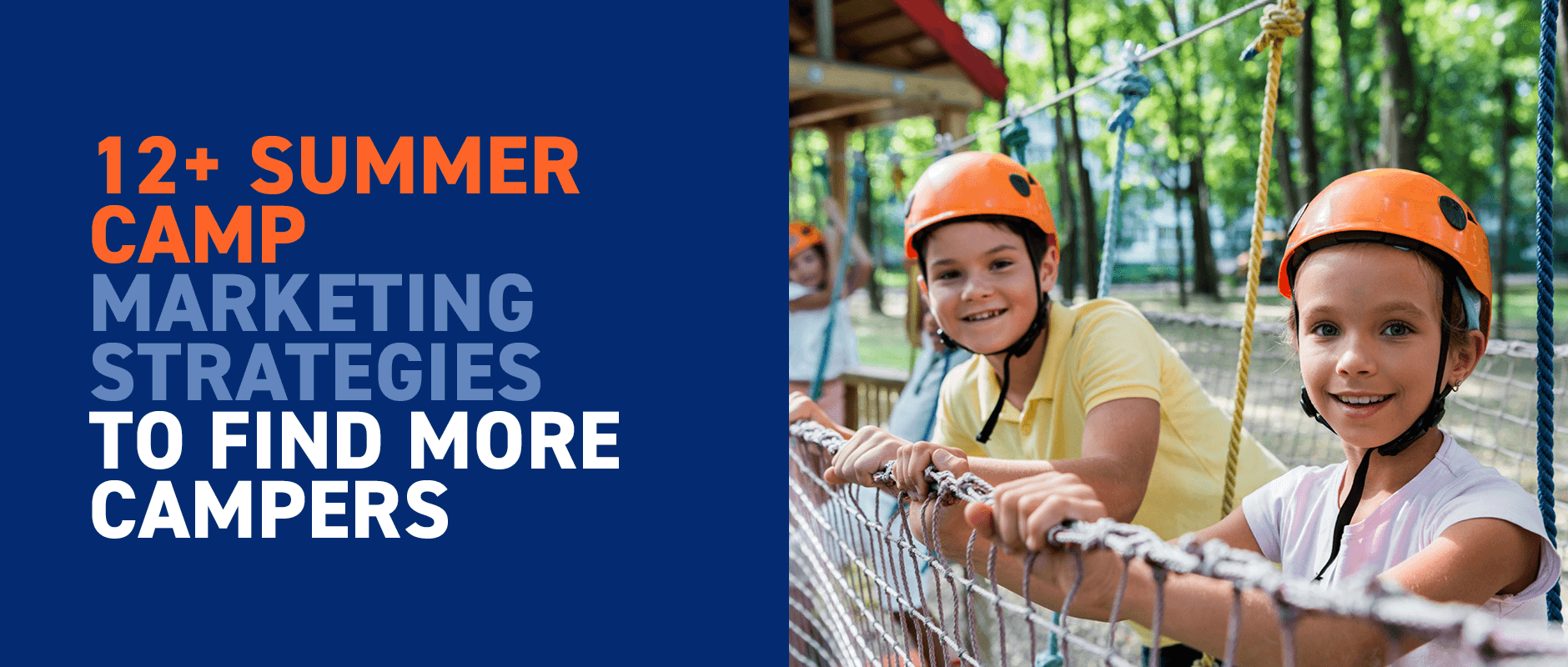12+ Summer Camp Marketing Strategies to Find More Campers
Updated

Marketing for your summer camp should start long before camp registration opens. To build excitement and attract new faces, you need strong summer camp marketing strategies you can rely on throughout the entire year.
Whether your focus is on retaining returning campers, finding ways to connect with new ones, or looking for general marketing best practices, our guide will review the top marketing strategies for summer camps:
In this article, we’ve separated our top ten marketing strategies for summer camps into three categories:
Let’s get started, so that you can make the most of this winter and start prepping for the best summer ever!

Summer camp marketing strategies for returning campers.
Marketing effectively to your campers is crucial to ensure that you have a successful summer. Your repeat campers are the ones that keep your camp running year after year. To guarantee that you keep these campers coming back, make sure that you establish good marketing habits to reach out to them as soon as possible!
1. Communicate frequently.
The number one way to maintain the relationship between your camp and your camp families is effective communication. You have to stay in the front of their minds, even between summers, so that by the time registration opens they’re ready to sign up.
Part of your marketing strategy for retaining campers should be keeping them up to date on everything that’s happening in the camp world. Do you have a monthly or quarterly newsletter where parents and kids can read all about renovations going on at camp, new activities that you’re planning, or new staffers being hired?
If you don’t, you should. Parents will enjoy being kept in-the-know about what’s going on at camp, and the kids will be thinking about how much they miss camp all through the off-season.
In order to make this strategy even more effective, consider segmenting your camp families into groups with commonalities. Segmentation is a strong marketing strategy because it allows you to create more specific and relevant advertisements in order to emphasize the aspects of your camp that your segments will be most interested in.
Some common segments for improving your summer camp marketing strategies are:
- Age groups. Split your camp population by what age group the child falls into, so that you can send age-appropriate marketing materials to the families.
- Camp interests. Is there a dedicated crew of kids that always signs up for rock climbing? Or horseback riding? Or painting? Whatever the interest is, make sure that those families are aware of how you’re planning on offering or expanding those activities in the coming camp season.
- Geographic location. If some of your camp families are close by, consider extending an invitation to them in the off-season to come check out the changes being made around camp.
Because you already know these camp families thanks to their time spent at your camp before, you should take the time to create specialized and targeted marketing materials for them. They’ll appreciate that you provide them with the most value based on their interests, and it’ll keep you at the front of their minds while they’re making their summer plans.
2. Early bird discounts.
Once registration opens for your camp’s upcoming sessions, it’s time to make your efforts from the previous months count. A few weeks before registration opens, begin reminding the parents of your campers that registration will open soon.

In order to incentivize your camp parents to register their children as soon as possible, offer them an early bird discount if they register within the first month of registration. You can choose whatever timeline is most appropriate for your camp’s registration timeline.
When you’re emailing, texting, or sending mail to your parents, use language that inspires urgency to ensure that they register their children promptly upon receiving the notification.
Phrases like the following are all effective ways of creating urgency:
- “Don’t wait!”
- “Apply now!”
- “Space is limited!”
Combining urgent and time-sensitive copy with a monetary incentive is a great way to encourage parents to register quickly.
Early registration is important for two factors: one, it gives your staff a litmus test for how your summer is going to go. If you’re able to quickly fill up enough spots to assure your staff that you’ll have enough kids at camp by the time the sessions start, you’ll be able to spend your time in the weeks leading up to the camp kick-off handing other tasks like training counselors and planning activities.
Two, it provides social proof for your camp that you can leverage to encourage new campers to register! When other families demonstrate their trust in your camp, your camp will be deemed more legitimate by families who aren’t familiar with your camp.
3. Referral discounts.
Another marketing technique to entice your campers to return, as well as find new faces, is to offer your campers a discount if they recruit their friends. Parents love discounts, and campers will love to share the greatness of camp with their friends
The best way to market these discounts (besides offering it to parents as a way to save money) is to target the kids themselves, and make them realize how much more fun camp could be if their best friend were by their side.
Send emails with fun images like:

- A picture of two kids having fun at camp, but with the faces cut out like a face-in-the-hole photo op. Then, caption the image, “This could be you and your bestie!” Or something similarly engaging. When you use fun, high-quality pictures, you’re more likely to emotionally engage with the reader.
- A picture of a two-person activity, like tetherball or a chess table, with a caption about how the only things missing from the picture are you and your friend. Again, using pictures makes it easier for kids to picture themselves in the situation and gets them more fired up to invite their friends.
While your campers’ parents are ultimately the ones who will make the decision about going to camp, don’t underestimate the power of word-of-mouth marketing from your campers at their schools, churches, dance lessons, or other extracurricular activities.
An important tip to keep in mind while marketing for your summer camp is that you have to appeal to your campers as well as their parents in your advertising materials. If your outreach materials don’t remind your campers of how much fun they had last summer and get them excited for the upcoming summer, you won’t be able to retain them in your community.
Summer camp marketing strategies for finding new campers.
While encouraging your campers to come back summer after summer is important, so too is finding new campers to expand your camp community. The strategy to find new campers won’t be based on reminding them of how much fun they had, but instead demonstrating to them the value that they’ll find if they join your community.
4. Reach out to local organizations for marketing opportunities.
When it comes time to find new families to bring into your camp community, don’t be afraid to reach out to other places that children and their parents spend their time. In order to find new children to learn about what your summer camp has to offer, consider exactly what that is and where you’ll find children who are interested in those things.
Think about your camp and ask the following questions:
- What type of children will find the most value in our programs?
- Which activities does our camp excel at providing?
- Where will these children spend their time outside of camp?
Once you have the answers to these questions, you’ll know where to look to find new campers. For example, if your camp has a science and math focus for children interested in STEM subjects, reach out to magnet schools and tutoring organizations to ask if you can hang fliers or send in brochures to place in the front office.
If your camp is physically focused, send marketing materials to dance studios, sports leagues, and school athletic programs. You could also reach out to coaches directly and ask them to send your camp’s website out over an email blast or Listserv. The coaches might even be willing to recommend your camp to promising athletes if you do a good enough job of selling your camp! 
Other organizations to reach out to in the community are:
- Local schools at all levels.
- Churches, if your camp is religiously affiliated.
- Sports leagues, gymnasiums, and studios.
- School extracurricular programs.
- Community centers and parks and rec departments.
The point is is that you don’t have to conduct cold outreach to find new campers. Just follow your nose to where the children who will be most interested in your camp spend their time. Then, make a connection at that organization with someone who can pass on your marketing materials to the appropriate people.
5. Offer a free tour of the camp to new families who are interested.
When marketing your camp to new families, don’t be afraid to get involved with them in a more personal way than just emailing them! Once you’ve generated some interest by reaching out to other organizations, invite your potential campers and their families out to the camp to meet some of the staffers and see the grounds.
Inviting your potential campers has a few benefits:
- The parents get comfortable with where they’ll be sending their child over the summer. They’ll appreciate the chance to see cabins, the nurse’s office, and any other places their child might be spending time.
- The campers will be more comfortable coming back if they’re already a little familiar with the layout of the camp. It can be hard to go somewhere for the first time without your family, so a pre-registration tour might be just the thing a shy child needs before signing up.
- Parents and kids alike get the chance to ask any lingering questions that they might have before registering. It’s easier to ask questions in person than to send them in an email that may or may not get a response.
A tour of your camp will pique the interest of the children more than any photo or video can, and by offering this value to your potential campers up-front your camp will be able to forge stronger relationships with potential camp families and encourage them to register.

6. Reach out to online resources.
Your camp, as do many other camps, may draw campers from other states or regions due to your resources, activities, or other offerings. If that’s the case, then it’s in your best interest to cast as wide a net as possible to market your camp to new families and campers.
The best way to reach out, regardless of geographic distance, is online! To get your camp in front of as many people as possible, work with other people to promote your camp.
There are many resources on the internet that parents use to find fun activities for their children. They read blogs by parents, look for recommendations from the local news journal or community magazine, and seek out referral lists from other websites.
In order to attract new campers to your programs, you have to be included in those resources! Think like a parent and search for terms that they would use like:
- Best summer camps for [child’s interest]
- Summer camps in [region]
- Top summer camps for [child’s age range]
Then see what resources appear! Once you know what parents find when they research camps, reach out to the writers of those resources and see what you can do to get your camp included in their lists. Don’t be afraid to include your camp’s marketing materials in your emails to them, so that they can see what your camp is all about before promoting it to their audiences.
Summer Camp Marketing Best Practices
No matter who you’re marketing to, some strategies will improve your marketing efforts for both old campers and new.
7. Define Your Audience.
So far, we’ve divided strategies into groups for returning campers and new campers. Parents who are already familiar with your camp have different needs and interests from those who are brand new to your organization!
It’s a common mistake in marketing to create outreach content first and consider what audience to send it to second. This approach turns connecting with potential audiences into a game of guess-and-check, not to mention that sending the wrong messages can often confuse recipients.
Before creating any marketing content, get a granular view of your various audiences by considering the following:
- Prior knowledge of your camp. Since previous campers and their families already know about your camp, your marketing strategies should focus on reinforcing their positive experiences and highlighting anything new that might excite them. In contrast, families brand new to your camp will need a basic introduction that explains your camp’s purpose and activities.
- Prospective campers’ interests. A sports camp is aimed at a different crowd than an arts-based camp, which has a different audience than a science camp. Emphasize activities that represent your camp’s offerings in your marketing to attract the right audience.
- Parents’ values. While camper interest goes a long way in driving registrations, it’s typically parents who are registering and paying for your camp experience. Your marketing materials should share details about your summer camp that will resonate with parents, whether that’s offering high-value programming, providing memorable social experiences, or furthering campers’ education.
- Family’s budgets. Consider your camp registration fees and how they will impact your target audience. For instance, a low-cost day camp will have a different audience than a months-long, intensive sports training camp.
- Parent concerns. Put yourself in parents’ shoes to consider what obstacles and concerns prevent them from signing their children up for a summer camp. These might include safety concerns, lack of knowledge about local summer camp programs, or even the worry that they might miss their kids too much.
Once you have a solid picture of your audience, you can create marketing materials that speak to their values, address their concerns, and provide the right information to motivate them to register.
8. Establish Your Value Proposition.
No matter what you are selling, a value proposition is the foundation of your product or service’s marketing. A value proposition is a one-to-two sentence statement that explains what you are marketing and why someone should buy it.
You can determine your summer camp’s value proposition by considering these three factors:

- Audience needs. What is your audience looking for in a summer camp? Consider what problems or needs your audience has that your summer camp might solve, whether it’s a need for educational activities or full-day child care.
- Product or service features. What does your camp offer? In addition to programming, consider factors like budget, communication, location, professionalism, and anything else your audience may value.
- Differentiators. What sets your summer camp apart from other similar camps? Depending on where your camp is located, parents may have several other camps—or summer programs in general—to choose between. Consider what makes your camp unique, whether it’s your programming, location, or price point.
Once you know what your value proposition is, make it the centerpiece of your marketing strategy. All of your content should reinforce why your camp is unique, valuable, and exactly what parents and campers are looking for.
9. Improve your website and online registration process.
Your marketing efforts are to drive interested families to register for your camps, so why make registering any harder than it needs to be? In order to make sure that you cinch every possible registration for camp, take the hassle out of it for your camp families.
Three tips for improving your website and registration process are:
- Make sure that your website is attractive and mobile-responsive, so parents can learn about your camp from desktop, mobile, and tablet.
- Make it easy for parents to sign waivers, submit required documentation, and pay for camp online when they decide to register.
- Include ways for parents to ensure that their child will be happy at camp with bunkmate requests, activity selection, and add-on purchases for things like t-shirts and other merch.
Whether your website is an attractive landing page for parents just learning about camp or a familiar site for returning campers, it should direct visitors to registering for camp and then make the registration process as easy as possible.
Your marketing efforts will have a higher payoff when every step of the camper sales cycle is as effective as it can be!
10. Reach out on social media.
Your camp’s website isn’t the only way to have an online presence. Don’t be afraid to use social media to stay involved with your campers after the summer is over and reach out to new campers.
Consider the age range and interests of your campers and their families: where will they spend their free time online? Popular social media platforms like Facebook, Twitter, and Instagram are great places to advertise to potential campers. Then, remind your returning campers of how much fun they had last summer by posting pictures and sharing your campers’ posts.
You can also use social media to advertise your registration periods and any off-season events you might be hosting! Which brings us to our next point.
11. Host an open house during the spring.
To build excitement for your camp, reconnect with returning families, and give new families the opportunity to explore the grounds before committing for the summer, host an open house on your campgrounds during the spring.
Campers will love having the opportunity to catch up with their friends from the summer and align on activities and bunk situations, and parents appreciate getting to re-familiarize themselves with the organization that will be caring for their children over the summer.
An open house might also encourage families to come out that were interested in registering but didn’t want to commit to an individual tour earlier in the season. Plus, bringing them in to see the other camp families will provide social proof for your camp as well as give their kids the opportunity to meet other children before attending the camp.
12. Rely on authenticity and relationships.
No matter where you’re posting or how, exactly, you’re marketing your summer camp, the most important thing is that you talk about your camp with authenticity. Demonstrating to the world why camp brings you and your community joy is the best way to convert curious kids into happy campers.
In order to rely on authenticity to market your camp, try some of the following strategies:
- Ask for real reviews from campers and parents to post on your website, on Yelp or Google Reviews, and on Facebook.
- Use candid photos from last summer (with parents’ permission!)
- Encourage your campers to wear their camp t-shirts, put stickers on their water bottles or bumper stickers on their parents’ cars, and to share your posts online.

Using the relationships that you’ve built with your campers to draw in more is a great sustainable marketing effort that you can rely on year after year.
13. sell branded merchandise to your returning campers that will help advertise to new campers.
Everyone loves merchandise that is connected to their favorite brand. In your marketing efforts, sell branded merchandise designed to get the word out about the upcoming camp season. For example, you might design a hat with the phrase “Summer Camp or Bust!” written on it that showcases your camp’s name and logo. Advertise this merchandise as “exclusive” and sell it for a limited time to encourage returning campers and their families to buy it.
Here are some options you might consider when picking with merchandise to customize and sell:

-
Apparel like t-shirts, socks, and hats
-
Keychains
-
Facemasks
-
Bumper stickers
-
Water bottles
-
Frisbees
-
Drawstring backpacks or totes
Selling branded merchandise to your returning campers will get people talking about your camp. When your campers’ friends see them wearing hats or throwing frisbees branded with your camp information, your camper can tell them how much they love spending summers at your camp. This will encourage new campers to sign up! Plus, you’ll get a boost in your funding during the registration process as you sell your merchandise!
Summer camp marketing is an important part of your summer camp’s life cycle: in fact, it’s probably one of your most important jobs during the off-season. When you can effectively market your camp to campers both old and new, you’ll be able to focus the rest of your energy on creating the best summer activity plan that you can.
If you’re looking for more resources on running the best camp possible, check out a few of our favorite articles:
- The Ultimate Camp Management Toolkit. Learn more about what features your camp software should have to help you run the best camp ever!
- Summer Camp Evaluation Forms. Learn how to make your camp better summer after summer by sending evals to campers, parents, and counselors.
- Camp Registration Software Features. How can you improve your registration rates? Learn what features your camp needs with our easy guide.
Written by Rob Burns
Rob Burns is the Senior Director of Business Development at CIRCUITREE and Bunk1, providing camps and conference centers with leading tools and resources. Rob is also the founder of the nonprofit Run2Revive and a regular conference speaker for the American Camp Association.
